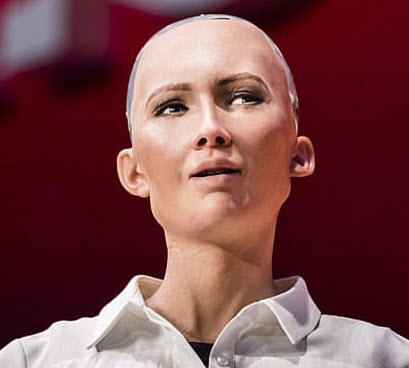The advent of the “Humanoid robots” and “Artificial Intelligence” is posing a challenge to the law makers and interpreters on how does the current laws affect the actions of these machines. Saudi Arabia has created a complication by granting “Citizenship” to a humanoid robot called “Sophia”.
The stories about and interviews of Sophia by journalists (Refer one article here) indicate that we may be in for some interesting debates on whether Sophia can raise a “Family” etc., but we as observers of Cyber Law need to also discuss whether Sophia can commit a Cyber Crime and if so how should our law deal with it.
While Sophia may be a good girl now and take some time to learn the bad habits of humans, commission of “Offences” through misuse of so called “Artificial Intelligence” or even the malfunction of AI or a simple automated functionality is a day to day problem to be dealt with.
When E Commerce Act 1998 was drafted in India or when ITA 2000 was enacted or when it was modified in 2008, we could not think of a “Humanoid Robot” as a citizen of a country a reality. But within two decades of the sprouting of the first thoughts of Cyber Laws in India, we are now staring at a possibility that a humanoid robot can claim the rights of a citizen. While some Islamic fundamentalists are already asking why this citizen of Saudi Arabia is not wearing a hijab or a burkah, we need to ask, what happens if Sophia commits an offence knowingly or unknowingly.
It is to the credit of our law drafters that we can still consider that ITA 2000/8 can address such a situation since knowingly or unknowingly a provision was created in the law to meet such contingencies.
Under Section 11 of ITA 2000 it is stated that “An electronic record shall be attributed to the originator if it was sent by an information system programmed by or on behalf of the originator to operate automatically”.
Since all actions of the robot has to be by means of an “Electronic Document” (which is an aggregation of binary impulses), and each such document can be attributed to the person who originated the binary impulse/s, the actions of the robot can be legally attributed to the person who caused the information system (i.e. the robot) to behave in that manner.
Hanson Robotics, the company which has created Sophia will therefore be firstly liable for all actions of Sophia. However, since Sophia has been “Adopted” by the Saudi Arabian Government, one can argue that the responsibility for the actions of Sophia shifts to the Saudi Arabian Government. Hence Sophia becomes a “Government Property” of the Saudi Government and actions against her would be a war against Saudi and actions from her could be an action of the Saudi Government.
If therefore Sophia breaks any law of India, we should be prepared to launch an international litigation against Saudi Government which is considered a “Friendly Country” for India. I urge Ms Sushma Swaraj to think if we need a special “Treaty” with not only Saudi Government but also any other Government which in future would adopt such “Robots” as citizens so that any intended or unintended transgressions of Indian law by these robots would be considered as actions of the respective Governments and India retains the right to take actions against such Governments.
There is also a threat that sooner or later, just as Drones have become tools of terrorism, Sophia and her family may be taken over and radicalized by muslim terrorists and commit terror acts. We need to be prepared for such contingencies.
In this context, I would also like to warn all AI professionals that any AI device created by them will also be creating liabilities to the creators and they need to take necessary steps to ensure that what they consider as “Technical Snags” donot result in “Cyber Crimes” and put the creators behind bars.
Be Aware, Be compliant, Be Safe.
Naavi









Excellent exposition. I feel intuitively that the creators of Sophia, having sold her are absolved of all liabilities. I assume that Sophia can be reprogrammed by the owners
Mukul Jain
New Delhi
I really like your writing style, good info, thanks for posting. It is really great to read and especially about my favorite topic robotics. Thaks for this post.